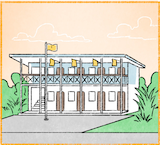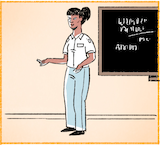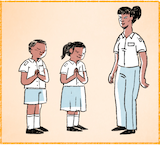




นี้คืออี่หยัง อันนี้เป็นโลงเลียน เบิ่งซงแล้วเป็นลักสะนะของโลงเลียน
แล้วเด็กน้อยมาเฮ็ดอี่หยังอยู่โลงเลียน เด็กน้อยนักเลียนมาเฮ็ดอี่หยังอยู่โลงเลียน กะมาเลียนหนังสือ
โลงเลียนเป็นหม้องให้ความฮู้ ขั้นเด็กน้อยมาโลงเลียน กะสิได้ความฮู้ ขั้นบ่มาโลงเลียน กะสิบ่ได้ความฮู้ กะสิปึก
โลงเลียนนี้มีจักซั้น โลงเลียนนี้มีสองซั้น มีซั้นหนึ่งกับซั้นสอง
เสาอยู่ข้างหน้าโลงเลียนนั้นเป็นเสาอี่หยัง เป็นเสาทงซาด ทุกโลงเลียนในปะเทดไทยสิมีเสาทงซาด เป็นเสาเคาลบทงซาดอยู่หน้าโลงเลียน แล้วกะมีทงซาดอยู่เทิงหลักเสานั้นพ้อม
เสาอันนี้กับทงซาดอันนี้เอาไว้เฮ็ดหญัง เอาไว้ยืนเคาลบทงซาด ทุกมื้อเวลาสองโมงเซ้าที่นักเลียนไปโลงเลียน เด็กน้อยต้องมายืนเคาลบทงซาดอยู่หนี้ แล้วกะล้องเพงซาดของปะเทดไทย
17
นี้คือพุใด เขาเป็นพุใด เขาเป็นใผ เขาเป็นเด็กน้อยนักเลียน เป็นนักเลียน
เขาใส่ซุดนักเลียนอยู่ ตอนนี้เขากำลังแต่งซุดนักเลียนอยู่
แล้วเขาถืออี่หยังอยู่ เขาถือกะเปา เป็นกะเปาถือ เป็นกะเปาถือของนักเลียน
18
นี้คือพุใด อันนี้เป็นเด็กน้อยนักเลียน เป็นเด็กน้อยนักเลียนพุหญิง
เขาใส่ซุดอี่หยังอยู่ เขาใส่ซุดนักเลียน พุหญิงสิใส่ซุดนักเลียน แล้วกะใส่สิ้นพ้อม เป็นสิ้นกะโปงนักเลียน
แล้วในมือของเขานั้นถืออี่หยังอยู่ ถือกะเปานักเลียน เป็นกะเปานักเลียน เขากำลังถืออยู่
19
นี้คือพุใด อันนี้เป็นคู เป็นอาจาน
คูมีหน้าที่เฮ็ดหญัง คูมีหน้าที่สอน สอนหนังสือเด็กน้อยนักเลียน ให้นักเลียนมีความฮู้ ให้เด็กน้อยเลียนหนังสือเก่งๆ แล้วกะซ่อยบอกซ่อยสอนเด็กน้อยนักเลียน ให้เป็นคนดี แล้วกะตั้งใจเลียน
เห็นดำๆ อยู่ข้างหลังอาจานนั้นเป็นอี่หยัง เป็นกะดานดำ เอาไว้เขียน หลือเอาไว้สอนนักเลียน
สีขาวๆ ที่เขียนอยู่นั้นคืออี่หยัง เป็นซ่อก เอาไว้เขียนลงไปในกะดานดำนั้น ให้มันเกิดโตหนังสือ หลือให้เกิดสิ่งที่เฮาสิสอนลงไปในนั้น
20
เด็กน้อยนักเลียนกำลังเฮ็ดอี่หยัง กำลังไหว้อาจาน กำลังทำความเคาลบอาจาน
เขาเฮ็ดเฮ็ดหญัง เขาไหว้อาจานเฮ็ดหญัง เขากะไหว้เพื่อที่สิทำความเคาลบอาจาน
เด็กน้อยนักเลียนทุกคนที่อยู่ในโลงเลียนนั้น ขั้นพ้ออาจานคนใด ต้องไหว้ หลือสะหวัดดีอาจาน เพื่อทำความเคาลบ
Link to overview page
Link to dictionary
| Isaan | Pronunciation | Tones | Thai | English/Notes |
|---|---|---|---|---|
| นี้ | ni: | HF | นี้ | 1. this 2. here |
| คือ | khʉ: | HR | คือ | 1. to be, to resemble, like, as 2. why {บักหล้าคือบ่เก็บโต่ะแน่ = [addressing a young boy] Why haven't you cleared the table?} |
| อี่หยัง | i:-yaŋ | H-M | อะไร | 1. what {นี้คืออี่หยัง = What is this?} {มื้อนี้เจ้าเฮ็ดอี่หยัง = What are you doing today?} {กินเข้างายกับอี่หยัง = What did you have for breakfast?} 2. something, anything, (in negations) nothing {บ่ต้องเฮ็ดอี่หยังอีกเลยนอกจากใส่ปุย = [we] don't need to do anything besides adding fertilizer} |
| อัน | an | M | อัน | 1. thing, object 2. general clf. for objects |
| เป็น | pen | M | เป็น | 1. to be, to exist 2. to be able to 3. to suffer, sth. happens to 4. เป็นหญัง[...]คือ in initial position: why? {เป็นหญังเขากะคือแปงฟัน = Why is he brushing his teeth?} {เป็นหญังเคี่ยงบินมันคือสิตก = Why is the airplane falling down?} |
| โลงเลียน | lo:ŋ-li:an | HR-HR | โรงเรียน | school |
| เบิ่ง | bəŋ | H | ดู | 1. to look at, to see, to watch {เบิ่งโทละทัด = to watch TV} {เบิ่งหนัง = to watch a movie} 2. to guess {เบิ่งซงแล้ว ... = [I] guess / from what it looks like ...} |
| ซง | soŋ | HR | ทรง | 1. shape, form 2. as if, like Notes: translation to be confirmed |
| แล้ว | lɛ:o | HF | แล้ว | 1. finished 2. already 3. and then, and next (especially แล้วกะ) 4. auxiliary for past tense |
| ลักสะนะ | lak-sa-na | H-M-H | ลักษณะ | feature, characteristic, quality |
| ของ | khɔ:ŋ | M | ของ | of, belonging to |
| เด็กน้อย | dek-nɔ:i | M-HF | เด็ก, เด็กน้อย | child |
| มา | ma: | HR | มา | 1. to come 2. auxiliary expressing action towards the present or focal time {กะคุเฮ็ดมาจากอี่หยัง = What is the bucket made of?} {แล้วเขากะเก็บเงินจากพุนั้นมา = and then she takes the money of that person} |
| เฮ็ด | het | H | ทำ | to do, to make |
| อยู่ | yu: | H | อยู่ | 1. to be (located) at 2. yet, still 3. auxiliary indicating continuous or progressive action {ทอดปาอยู่ในกะทะ = (in the process of) frying a fish in the pan} {แม่กำลังเมี้ยนเฮียนอยู่ = mother is cleaning/tidying up the house} |
| นักเลียน | nak-li:an | H-HR | นักเรียน | student |
| กะ | ga | M | ก็ | 1. then, consequently 2. also |
| เลียน | li:an | HR | เรียน | to study, to learn {เลียนหนังสือ = to study} {เลียนจบ = to graduate} {เลียนเก่ง = to be a good student} |
| หนังสือ | naŋ-sʉ: | M-M | หนังสือ | 1. book {เลียนหนังสือ = to study} 2. text {เขียนหนังสือ = to write sth.} Notes: sentence-final: often with rising tone which is likely a Thai influence |
| หม้อง | mɔŋ | LF | ที่, แห่ง, บริเวณ | 1. place, area {หลายที่หลายหม้อง = in many places} {หม้องใดหม้องหนึ่ง = some place} 2. clf. for places |
| ให้ | hai | LF | ให้ | 1. to give {หมอกำลังเอายาให้คนป่วยกิน = the doctor is giving the patient medicine} 2. for 3. to allow, to be allowed |
| ความฮู้ | khwa:m-hu: | HR-HF | ความรู้ | knowledge Notes: see also ความลู้ |
| ขั้น | khan | LF | เมื่อ | when, if |
| สิ | si | M | จะ | future tense auxiliary {เขากำลังสิตื่น = he's about to wake up} {สิไปตะหลาด = [I'm] going to the market} |
| ได้ | dai | HF | ได้ | 1. can 2. to get, to obtain 3. before verb: indicating past tense 4. บ่ได้ + verb: not |
| บ่ | bɔ: | H | ไม่ | 1. no, not 2. question particle, transforming a statement into a question Notes: spelling exception in line with common usage on social media |
| ปึก | pʉk | M | ปึก | 1. bundle of paper etc. 2. stupid |
| มี | mi: | HR | มี | 1. to have 2. there is |
| จัก | jak | M | จัก | 1. answer to a question: [I] don't know, don't know exactly, [I'm] not sure {พุซายคนนี้เขาเถ้าไป่ จัก จักเถ้าหลือบ่เถ้า เบิ่งบ่ค่อยออก = Is this man here already old? I don't know. I can't see clearly whether he's old or not.} {เขาเว้ากันอยู่ใส จักคือกัน = Where are they talking? I don't know either.} 2. exact(ly), what exactly {จักต้มอี่หยังกะบ่ฮู้ = I don't know what (exactly) he is cooking} {บ่ลู้คือกันจักปาอี่หยัง = I don't know either what kind of fish this is} 3. how much/many? {ต้นไม้มีจักต้น = How many trees are there?} {ตอนนี้จักโมงแล้ว = What time is it now?} {มือของเฮานี้สิมีจักนิ้ว = How many fingers do our hands have?} 4. a bit, a little bit {จักหน่อย/จักหน่อยหนึ่ง = a bit, a little bit} |
| ซั้น | san | HF | ชั้น | 1. floor, shelf, step of a staircase {ซั้นเก็บเสี้ยผ้า = clothes shelf} {ซั้นวางหนังสือ = book shelf} 2. level, grade, class {ซั้นมอสี่ = secondary school grade four} 3. layer |
| สอง | sɔ:ŋ | M | สอง | two |
| หนึ่ง | nʉŋ | H | หนึ่ง | 1. one 2. after adjective: intensifier {บักคักหนึ่ง = very much} {อันบักใหญ่หนึ่ง = very large}, or attenuates the meaning {กะดาดมันแผ่นน้อยๆ หนึ่ง = the piece of paper is [relatively] small} |
| กับ | gap | M | กับ | 1. and {ลุงกับป้า = uncle and aunt} {กวยเตียวหมูกับกวยเตียวไก่ = noodle soup with pork and noodle soup with chicken} 2. with, to {ค้ายๆ กับคำว่า ... = similar to the word ...} 3. prefix in front of foods {กับเข้า = side dishes eaten with rice} {เขากินกับกวยเตียว = he's eating noodle soup} |
| เสา | sao | M | เสา | pillar, column, post, pole {เสาธงซาด = flag pole} |
| ข้างหน้า | kha:ŋ-na: | LF-LF | ข้างหน้า | in front, forward |
| นั้น | nan | HF | นั้น | that, there |
| ทงซาด | thoŋ-sa:t | HR-HF | ธงชาติ | national flag |
| ทุก | thuk | H | ทุก | every Notes: also pronounced ทุ as in ทุมื้อๆ = everyday, always |
| ใน | nai | HR | ใน | in, within |
| ปะเทด | pa-thet | M-HF | ประเทศ | country {ปะเทดไทย = Thailand} |
| ไทย | tha:i | HR | ไทย | Thai {ปะเทดไทย = Thailand} {คนไทย = Thai (person)} |
| เคาลบ | khao-lop | HR-H | เคารพ | to respect, to honour, to value |
| หน้า | na: | LF | หน้า | 1. front {ปะตูหน้า = front door} 2. face {เขากำลังล้างหน้า = he's washing his face} 3. auxiliary: conditional tense {เขาหน้าสิเป็นพุบ่าวพุสาวกัน = they are probably groom and bride} {กะหน้าสิส้มอยู่ = it's likely to be sour} 4. season {หน้าฮ้อน = hot season} 5. page 6. clf. for pages {เฮาอ่านฮอดหน้านั้นแล้ว = we've read until this page} |
| เทิง | thə:ŋ | HR | บน | 1. on, on top of, at, in {เทิงโต่ะ = at/on the table} {กบมันนั่งอยู่เทิงใบบัว = the frog is sitting on the lotus leaf} {เทิงท้องฟ้า = in the sky} {มันแล่นอยู่เทิงลาง = [the train] runs on rails} {มีคนนั่งอยู่เทิงลดสามล้อสามคน = there are three people sitting in the tuk tuk} 2. up, upward Notes: pronunciation: also realized as ทัง |
| หลัก | lak | M | หลัก | 1. post, pole, pillar 2. main-, major- {คำว่าเมี้ยนนี้ หลักๆ หนิกะสิหมายถึงว่า [...] = the main meaning of the word เมี้ยน is [...]} |
| พ้อม | phɔ:m | HF | พร้อม | at the same time, also, too {มีตะเว็นพ้อม = the sun's out, too} {กะทะมีด้ามพ้อม = the pan has also a handle} |
| เอา | ao | M | เอา | to take, to give {เขากำลังเอาก่องไปซั่ง = he's taking the boxes to weigh them} {หมอกำลังเอายาให้คนป่วยกิน = the doctor is giving medicine to the patient} {เอาไว้ถ้า = is for, is used for, has the purpose of} |
| ไว้ | wai | HF | ไว้ | 1. to keep, to put, to place, to retain, to save, to reserve {เขาเอาหัวของเขาไว้ใส = Where does she put her head?} {หมาสิเลี้ยงไว้บ้าน = dogs are kept/raised in the house} {ไก่เลี้ยงไว้ในคอก = chicken are kept/raised in a coop} {หน้ามันบังไว้ = the face is covered/not visible} {เขาเอาโทละสับวางไว้หู = he holds the phone to his ear} 2. for {นาลิกาปุกมีไว้เฮ็ดหญัง = What is an alarm clock for?} {หม้อเอาไว้เฮ็ดแนวกิน = a pot is used to make food} {ก่องเอาไว้เฮ็ดหญัง ก่องเอาไว้ใส่ของ = What is the box for? It's for putting in stuff.} Notes: see also ไว้ถ้า |
| หญัง | ɲaŋ | M | อะไร, เป็นหญัง = ทำไม | 1. what {เขากำลังเฮ็ดหญัง = What is he doing?} {ธูปเอาไว้เฮ็ดหญัง = What are incense sticks for?} 2. something, anything, (nothing) 3. เป็นหญัง[...]คือ in initial position: why {เป็นหญังเขาคือใส่บักพิกลงไปในกวยเตียว = Why is he putting chili in [his] noodle soup?} {เป็นหญังหน้าต่างมันคือเปิด = Why is the window open?} {เป็นหญังมันคือมีควนไฟ = Why is there smoke?} |
| ยืน | yʉ:n | M | ยืน | to stand |
| มื้อ | mʉ: | HF | วัน | day |
| เวลา | we:-la: | HR-HR | เวลา | time, period |
| โมง | mo:ŋ | HR | โมง | o'clock, hour {ตอนนี้เวลาจักโมงแล้ว = What time is it?} {ตอนนี้เวลาห้าโมงเคิ่ง = It's half past five.} |
| เซ้า | sao | HF | เช้า | morning Notes: see also มื้อเซ้า, เข้าเซ้า |
| ที่ | thi: | H | ที่ | 1. that, which {คนที่ยืนอยู่ฝั่งขวา = the person which is standing on the right = the person standing on the right} {เว้าคำที่บ่สุพาบ = to speak words which are impolite = to speak impolitely} 2. for ordinal numbers {ที่สาม = third} |
| ไป | pai | M | ไป | 1. to go 2. auxiliary indicating action extending into the future |
| ต้อง | tɔŋ | HF | ต้อง | to have to, must |
| หนี้ | ni: | LF | นี่ | here |
| ล้อง | lɔ:ŋ | HF | ร้อง | 1. to sing 2. to cry |
| เพงซาด | phe:ŋ-sa:t | HR-HF | เพลงชาติ | national anthem |
| พุใด | phu-dai | H-M | ใคร | 1. who {มีพุใดโทมากะบ่ลู้ = I don't know who has called} {ห้องนอนของพุใด = whose bedroom (is this)? } 2. someone, somebody, anybody, in negative context: nobody {บ่มีพุใดอยู่กับเขาเลย = there's nobody with him} |
| เขา | khao | M | เขา | personal pronoun: he, she |
| ใผ | phai | M | ใคร | 1. who {พุซายคนนี้เป็นใผ = Who's this boy?} 2. somebody, someone, anybody, with negative: nobody {บ่มีใผอยู่หนี้จักคนเลย = there's not a single person here} |
| ใส่ | sai | H | ใส่ | 1. to put something in/on {เขาใส่บักพิกในกวยเตียวหลาย = he's putting a lot of chili in his noodle soup} {เขาบีบยาสีฟันใส่แปงสีฟัน = he squeezes toothpaste on the toothbrush} {ก่องเอาไว้ใส่ของ = boxes are there to put stuff in} 2. to wear (clothes) {เขาใส่เสี้ยแขนญาว = he's wearing a long-sleeve} 3. directed at {เอิ้นใส่กัน = to call each other/to say to each other} {หมามันเห่าใส่แมว = the dog barks at the cat} {ล้องเพงใส่ไม = to sing into the microphone} {เขากำลังซี้มือไปใส่พุซาย = she's pointing at the man} |
| ซุด | sut | H | ชุด | dress, uniform {ซุดนักเลียน = school uniform} Notes: pronunciation: also realized as ชุด |
| ตอนนี้ | tɔ:n-ni: | M-HF | ตอนนี้ | now |
| กำลัง | gam-laŋ | M-HR | กำลัง | auxiliary indicating continuous or progressive action |
| แต่ง | tɛŋ | H | แต่ง | 1. to dress, to wear {แต่งซุดนักเลียน = to put on/wear a school uniform} 2. to marry {แต่งงาน = to marry} |
| ถือ | thʉ: | M | ถือ | 1. to hold 2. to carry 3. to regard as, to consider {สี่สิบองสาถือว่าฮ้อน = 40 degrees Celsius is considered hot} |
| กะเปา | ga-pao | M-M | กระเป๋า | bag, shopping bag, purse |
| พุหญิง | phu-ɲiŋ | H-M | ผู้หญิง | woman, female |
| สิ้น | sin | LF | ผ้าถุง, กระโปรง | skirt |
| กะโปง | ga-po:ŋ | M-M | กระโปรง | skirt Notes: see also สิ้น |
| มือ | mʉ: | HR | มือ | 1. hand 2. front leg/paw (e.g., of a cat) |
| คู | khu: | HR | ครู | teacher |
| อาจาน | a:-ja:n | M-M | อาจารย์ | teacher |
| หน้าที่ | na:-thi: | LF-H | หน้าที่ | duty, responsibility, obligation, function |
| สอน | sɔ:n | M | สอน | to teach |
| เก่ง | geŋ | H | เก่ง | good at, expert, proficient |
| ซ่อย | sɔ:i | H | ช่วย | to help, to assist {ขอบใจเด้อที่มาซ่อย = Many thanks for your help!} |
| บอก | bɔ:k | LF | บอก | to tell, to say, to suggest, to advise |
| คน | khon | HR | คน | person, people |
| ดี | di: | M | ดี | good |
| ตั้งใจ | taŋ-jai | HF-M | ตั้งใจ | to pay attention, to study carefully |
| เห็น | hen | M | เห็น | to see |
| ดำ | dam | M | ดำ | 1. black 2. to transplant rice seedlings {ดำนา = to transplant rice seedlings} |
| ข้างหลัง | kha:ŋ-laŋ | LF-M | ข้างหลัง | behind, in the back of |
| กะดาน | ga-da:n | M-M | กระดาน | board {กะดานดำ = blackboard} |
| เขียน | khi:an | M | เขียน | to write |
| หลือ | lʉ: | M | หรือ | or |
| สี | si: | M | สี | 1. color 2. colored pencil, crayon |
| ขาว | kha:o | M | ขาว | white |
| ซ่อก | sɔk | H | ชอล์ก | chalk |
| ลง | loŋ | HR | ลง | 1. to descend, to lower, to go down 2. down 3. bus/train etc.: to get off, to disembark {คนกำลังลงลดบั่ด = people are getting off the bus} 4. boat/ship etc.: to get on, to board {เขากำลังญ่างลงเลีย = he's boarding/getting on the boat} |
| มัน | man | HR | มัน | it (also used to refer to people) |
| เกิด | gə:t | LF | เกิด | 1. (often together with ขึ้น) to happen, to arise, to take place {เกิดอี่หยังขึ้น = what is happening?} {บ่มีหญังเกิดขึ้น = nothing's happening} 2. to be born 3. to grow {หนวดกะคือสิเกิดอยู่ใต้ดัง = a moustache grows below the nose} |
| โตหนังสือ | to:-naŋ-sʉ: | M-M-M | ตัวหนังสือ | script: character, letter |
| สิ่ง | siŋ | H | สิ่ง | thing, object |
| เฮา | hao | HR | เรา | 1. personal pronoun: we 2. personal pronoun: I |
| ไหว้ | wai | LF | ไหว้ | to salute, to greet, to pay respect |
| ทำ | tham | HR | ทำ | to do |
| ความ | khwa:m | HR | ความ | 1. prefix: state, condition, quality 2. content, subject, matter, affair |
| เพื่อที่ | phʉ:a-thi: | H-H | เพื่อที่ | in order to, so that Notes: the vowel เอือ is likely to be a Thai loan |
| พ้อ | phɔ: | HF | พบ, เจอ | 1. to meet {จั่งพ้อกันใหม่ = See you again!} {คนที่หัวกะเคยพ้อกัน = someone [we've] just met} {ขั้นพ้ออาจานคนใด ต้อง ... = whenever you meet a teacher, you need to ...} 2. to encounter, to find {เขาหาเหล้มนั้นบ่พ้อ = he doesn't find that book} |
| ใด | dai | M | ใด | 1. which, that one which, what, how {เขานั่งแบบใด เขานั่งขดตะหมาดอยู่ = How is he sitting? He's sitting cross-legged.} {ตอนใด = when?} 2. whichever, whoever {หม้องใดหม้องหนึ่ง = some place, somewhere} {ขั้นเฮาอยากตื่นญามใด เฮากะตั้งเวลาปุกญามนั้น = If we want to get up at a certain time, we set the alarm to that time} Notes: sentence-final often with a marked rising tone |
| สะหวัดดี | sa-wat-di: | M-M-M | สวัสดี | polite greeting: hello, good day, good morning, good evening etc. |
| เพื่อ | phʉ:a | H | เพื่อ | for Notes: the vowel เอือ is likely to be a Thai loan; pronunciation: also realized as เพี่ย |